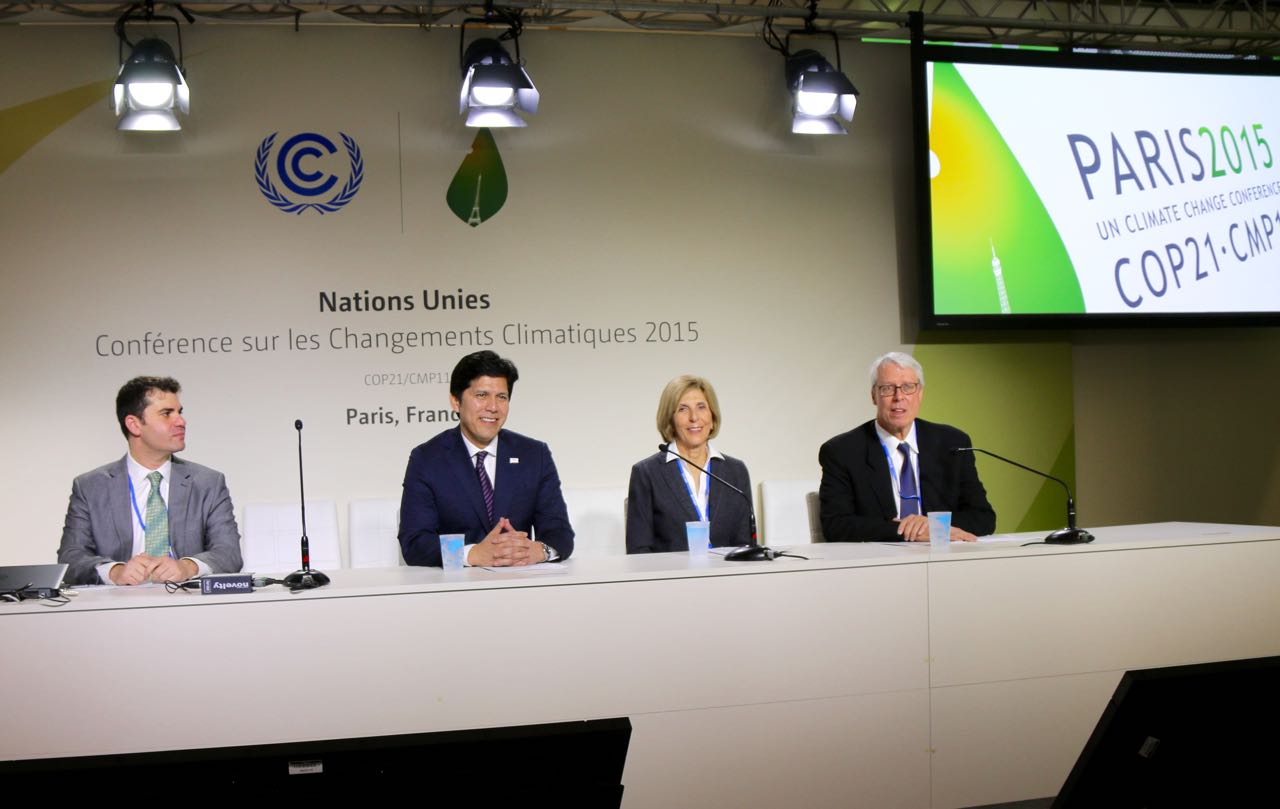- Negotiations near close
- History in the making
- Change starts at home
- The new tide
- “The greatest climate crime of the century”
- Beyond Paris
NEGOTIATIONS NEAR CLOSE
Greetings from the Le Bourget convention site of the U.N. climate negotiations in Paris.
As I write, participants are hurried finishing two weeks of intense high-profile diplomatic talks.Last week, 150 heads of state gathered here – history’s largest meeting of world leaders.The halls are bustling, as government ministers, negotiators, members of the media, and non-governmental participants rush to close a deal to replace the Kyoto Protocol as the global agreement to address our changing climate – now widely seen as the planet’s top threat.
People have come from every country on Earth. Walking the halls, I hear a multitude of languages. Cameras interview indigenous peoples in traditional dress, out of place in the sea of western suits. Security is tight.
The talks are extremely complex and high stakes. Two hundred nations agreeing on anything is hard enough – add in a rapidly changing global climate and widely diverse economic power, historical responsibility for the problem, and economic dependency on climate-altering industries and no wonder U.N. Secretary General Ban Ki-moon calls them “the most complicated and difficult” in history.
The last few days, lead negotiators have worked late into the night, many emerging blurry eyed the next afternoon. By many accounts, governments are very close to agreement, but there have been serious conflicts: Saudi Arabia wants to be compensated for lost revenue if it cannot sell its oil as the world limits emissions. The Marshall Islands, which faces extinction as sea levels rise, said it won’t sign an agreement that limits global temperature rise beyond the still potentially disastrous 1.5 C. U.S. officials in private say they’re skeptical how the world’s largest economy can transition to clean energy sources in time to stop catastrophic climate change.
HISTORY IN THE MAKING
Somber from the recent attacks, Paris is a historic moment. For the first time, all nations on Earth may join together in an agreement applicable to all nations to act on climate change. This is huge: the United States never ratified the Kyoto Protocol, the previous global treaty on climate change – a big gap as the U.S. remains the sole superpower and contributor of 29% of historic climate pollution.
The draft agreement, which would replace the Kyoto Protocol after 2020, aims to keep temperatures below 2 degrees by peaking global emissions “as soon as possible” and transitioning from pollution-intensive industries by the end of the century. (According to many scientists, this is likely far too late – temperatures are rising fast and this year the world surpassed the ominous 400 parts per million CO2 in the atmospheric – the highest concentration in millions of years.)
Every five years, countries would submit new plans that must be bolder than the last. It also builds an emergency fund, like a global FEMA, that is sorely needed as climate chaos increases. “At the moment it’s just rainstorms, drought, and minor migrations,” said one U.S. elected official involved in the talks. “Syria is minor compared to what’s coming.”
CHANGE STARTS AT HOME
As the world’s biggest polluter, the United States has often been a key block in past summits and continues to oppose a binding treaty, in part to avoid Senate ratification that doomed the Kyoto Protocol. But there are signs of real commitment: President Obama has made climate a top priority in his final year in office and launched the Clean Power Plan, which if implemented could transition the U.S. to 43% clean energy by 2030. The U.S.’s top diplomat, Secretary of State John Kerry, usually constantly on the move, has been in Paris for a full week – and is personally committed to seal a deal at Paris.
Despite Congress’s failure to act, state and local governments have made clean energy asuccess story – one of the fastest growing economic sectors in the U.S. with 360,000 jobs.American solar alone employs 143,000 workers – more than in coal mines. Last year, America added more clean power than fracked gas, with clean energy up 11 percent as gas declined. Demonstrating the opportunity, solar jobs grew 20 times faster than the rest of the economy. A new solar project is installed every 2.5 minutes.
In Paris, my mission is to help amplify the voices of lawmakers across the United States calling for a clean energy future. This week at the negotiation halls, we launched a letter signed by over 350 state & local elected officials from 46 states calling for 100% clean energy by 2050. At the press conference was Senate President pro Tempore Kevin de Leon of California, lead legislator in the world’s 7th largest economy, who said, “If Congress won’t act, it’s incumbent on state and local leaders to do the job for them.”
Frank Cownie, Mayor of Des Monies, Iowa said what exists must be possible: “Our region used to be coal country, and now is powered by 40 percent wind. 100 years ago there were 23 coal mines in the city and now we’re growing new, clean industries – citizens made it happen by blocking dirty coal and demanding clean energy.”
Bill McKibben promoted the announcement on Twitter, writing “this is huge, shows the new tide.”

THE NEW TIDE
As the oceans rise, the tides of humanity are rising, too. In Paris, I’ve talked with people around the world working to transition their communities to a just and clean future.
Around the world, citizens are demanding an end to the era of dirty fossil fuels that are fueling climate change — and winning. From Iowa to Romania, there’s hardly a new fossil fuel project anywhere that’s not meeting people willing to put their bodies on the line to stop it. From banning fracking in New York last December – the first state to do so on public health grounds — to stopping Shell attic drilling, fossil fuels are starting to go the way of, well, fossils.
“Over $200 billion in fossil fuel projects have been canceled last year alone,” said Mark Campanale, founder of CarbonTracker.
In fight against fossil fuels, a keystone victory this year was Keystone XL, which would have carried millions of barrels of oil a day from Alberta old growth forests to the Gulf of Mexico – enough carbon to overcook the climate. Resistance started with First Nation People’s, spreading to unite unlikely allies, from ranchers to tribal elders to priests – and eventually many (the author included) encircling the White House arm-in-arm in protest. After years of organizing, onNovember 6 President Obama announced that that he would cancel the project, as it did not serve the national interest. The historic victory set a new standard for climate leadership: keeping fossil fuels in the ground.
“THE GREATEST CLIMATE CRIME OF THE CENTURY”
Citizens around the world are leading, and our leaders are starting to follow. But political will to act has been drowned out by the millions of dollars that dirty energy companies spend to sow doubt and denial. As the world heats up, droughts intensify, crops fail, coastal cities flood, and nations drown, who will pay for the trillions in damage?

What happens when history’s most profitable company is responsible for history’s most costly disaster – and then misled the public about it for decades?
Probably the most poignant moment in the past two weeks was the side event “The People vs. Exxon Mobil.” Set in a makeshift “courtroom” to a packed audience, three respected climate advocates presided as judges, as renown authors Bill McKibben and Naomi Klein played the part of prosecutors. Expert witness after expert witness took the stand, delivering powerful testimony cataloging how Exxon understood the science of climate change back in at least 1981, and then for 25 years engaged in a worldwide campaign of disinformation and deception.
Big Tobacco’s products killed half a million people a year in the United States before they were brought to justice for their decades of deception. How many more lives must we lose before Exxon and co-conspirators become clean?
Michael Gerrard, prominent Columbia la
Pressure to revoke Exxon’s social license to operate is mounting: New York State Attorney General Eric launched a subpoena, Hillary Clinton joined other presidential candidates calling for a full investigation, Secretary Kerry said Exxon could lose billions in class action lawsuits. Although it’s just one company, it’s the biggest, and bringing its climate lies to light is essential to build the political will to act.
BEYOND PARIS
As we close on the final hours of talks, it’s clear an agreement in Paris will be nowhere near enough – but it will be a step forward. One powerful next step is to end the $5.3 trillion in public subsidies that we give to fossil fuels each year – that’s $10 million a minute! And we can start with our pensions. When California voted this year on divesting its pension funds from fossil fuels, State Senator Brad Hoylman of New York, said “We should not be investing in companies that are causing the destruction of our planet.”
For me, participating in Paris is coming full circle. The first U.N. climate talks I participated in was Bali in 2007, which kicked-started the process to renegotiate the Kyoto Protocol. Since then, many things have happened, from losing my grandparents, completing nearly 8 years of service on the Caroline Town Council, moving away from my childhood home, and learning the language and culture in Freiburg, Germany’s greenest city.
Eight years later, in the halls in Paris I saw a new generation of young people, whose have lived their entire lives as the world negotiates their fate. But young people are not waiting, they’re leading the way – pushing to divest their schools and communities from fossil fuels, putting their bodies on the line to stop coal, oil, and fracking, and helping build a clean, just, and sustainable economy for all.
May the young people of today and tomorrow – and all of us together – be the ones who rise to meet the urgent challenge and opportunity of this moment.
All best wishes,
Dominic
